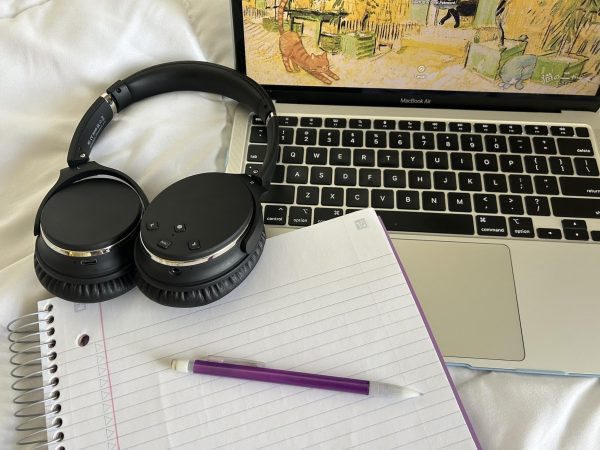Students explain why they pay for costly products
January 16, 2013
With rent due and holiday presents to buy, you promised yourself you’d cut back — until that grande skinny peppermint mocha at Starbucks called your name. Your roommate said she’d quit smoking, but she bought another pack last night.
Here, students and professionals weigh in on why college students continue to pay the price for costly habits.
Starbucks addicts
Starbucks is in a convenient location on Lincoln Street, drawing Liz Vertosick, senior advertising major, from Franklin Hall at least twice a week. Vertosick said she usually pays with gift cards — but reloads the cards with her own money.
“I feel like I’m not spending money if I’m using a gift card,” she said. “It still adds up.”
Emily Dix, senior fashion merchandising major, also has a short walk to get her cup of coffee. She said she sometimes goes twice per day.
“I don’t want to know [how much I spend], but maybe a good $10 or $15 a week,” she said. “I just get coffee, and refills are 50 cents.”
A daily visit to Starbucks, spending $15 per week, would amount to $780 in a year.
Dix said what keeps her coming back isn’t just the coffee.
“The atmosphere and everything,” she said. “I can’t study in a library.”
Smokers
Jeri James, freshman criminal justice major and mother of three, is trying to quit smoking.
“Not just for my health — it’d be cheaper,” she said.
If a pack of cigarettes cost $5, a pack-a-day smoker would spend more than $1,800 a year.
James started smoking when she was just 11 years old. She said the hardest part about quitting was the behaviors associated with smoking.
“It’s the habits, when you first get up [in the morning], when you eat.” She said. “It’s the bad habits.”
Sophomore exploratory major Brittney Hall has tried to quit with little luck. Hall smoked cigarettes with her friends as a teenager, but didn’t start buying them herself until about eight months ago.
“All my friends smoked, so I just kind of picked up the habit,” she said.
Sitting outside with books open in front of her, Hall said smoking was a stress reliever.
“Right now, I was studying and took a break to smoke a cigarette,” she said. “When I’m stressed, that’s like the first thing I want is a cigarette.”
Drinkers
According to Xavier.edu, the average college student will spend more than $450 on alcohol per year, mostly on beer. Every Friday night in Kent, people crowd outside Stone Tavern while a band plays inside. Jeff Tell, senior exercise science major, stood outside the bar with two friends.
Going out once or twice a week is worth the cost, Tell said, to see friends and enjoy live music.
“I like the opportunity to see other people. … Just to get out,” he said. “It’s a nice atmosphere downtown. It really is. There’s a good mixture of places you can drink and get food.”
Tom Zocolo, senior environmental conservation biology major, prefers not to go out to drink. He said for the cost of one or two drinks at a bar, he could buy a six-pack.
“[The bar]’s way more expensive and a huge profit margin,” Zocolo said.
He thinks the best way to save cash is not to go out at all.
“The cheapest beer you’re going get is at the shittiest bar,” he said.
Coca-Cola fans
“I drink a lot of Coke,” Andy Lovrak said with a laugh.
He’s not kidding. Lovrak, sophomore advertising major, drinks at least three cans of Diet Coke per day and gets migraines when he goes without.
Because Kent State is in a five-year contract with Pepsi, Lovrak takes trips to Wal-Mart at least once every other week to buy 24-can cases of Coke. Though the cases don’t cost much, there is the added cost of travel. But Lovrak said he would not get desperate enough to reach for a Pepsi.
“I never run out [of Coca-Cola]. That doesn’t happen. I know better,” he said.
Lovrak and his roommate have collected seven cases of the soda cans this semester and have stacked them beside their door, reaching the top of the doorframe.
“It started because we were super lazy and didn’t want to take the Coke boxes to the trash,” Lovrak said. “And then we didn’t have room, so we started stacking them.”
Lovrak said he inherited his brand loyalty from his mother.
“I’ve kind of been addicted since I was a little kid,” he said, “so I’ve just always bought Coke products.”
Professionals weigh in
Robin Joynes, assistant professor of psychology, said evolution has programmed us to crave the things that release dopamine in our brains. At one time, people needed foods high in sugar and calories to hunt. The release of dopamine in our brains, she said, made us compelled to do those things again — and we had to, to survive.
Today, we don’t need to fight for survival, but our bodies still crave the good feeling that dopamine gives us.
“So even under times of duress — we don’t have money and we’re trying to cut back and things like that — we’re not going to give up certain things because those are the things that cause that squirt of dopamine, and we are compelled to do those behaviors again,” Joynes said.
Paul Albanese, associate professor of marketing, is currently doing research on compulsive buying behavior. He explained that a compulsive buyer is at a particular level in their personality development. A compulsive shopper, he said, is at the primitive level of development. Someone at this level will not think of the consequences of his or her actions and will continue to smoke, drink or rack up credit card debt.
“[If] you start smoking at the age of 12, there’s no way you can get to a higher level of personality development,” Albanese said. “There’s still a lot left to go through. But then you carry that addiction to nicotine with you.”
People who are fortunate enough to get to the higher, neurotic level of personality development will see further into the future and try to change their ways.
“They will never give up striving to quit smoking. Never. And it might take them eight or nine times, but they won’t give up,” Albanese said.
Stress may cause a person to regress in behavior, but a neurotic person, Albanese said, will still strive to get back on the wagon.
Joynes said when our body craves something, however, it’s tough to avoid that fix.
“That’s why we continue to pay for those things, even when we’re strapped for cash, because we crave it above all the other things,” she said. “We’d rather have that than something else — at least in your minds eye, in the moment. And when you’re craving it, you really, really want it.”
Angel Mack is the student finance reporter for the Daily Kent Stater.
Contact Angel Mack at [email protected].























